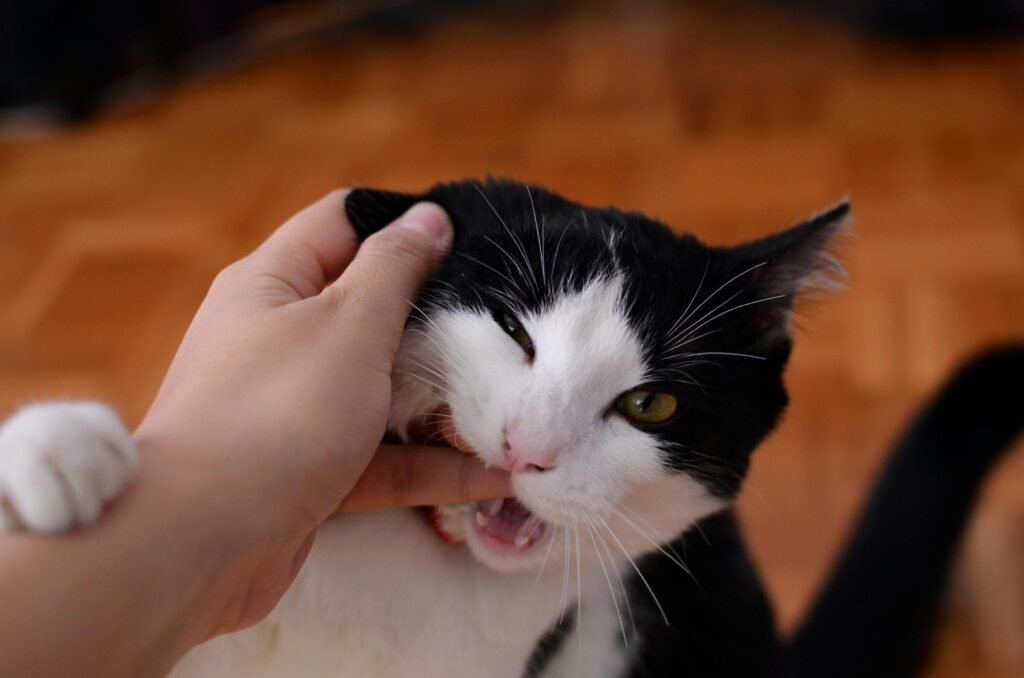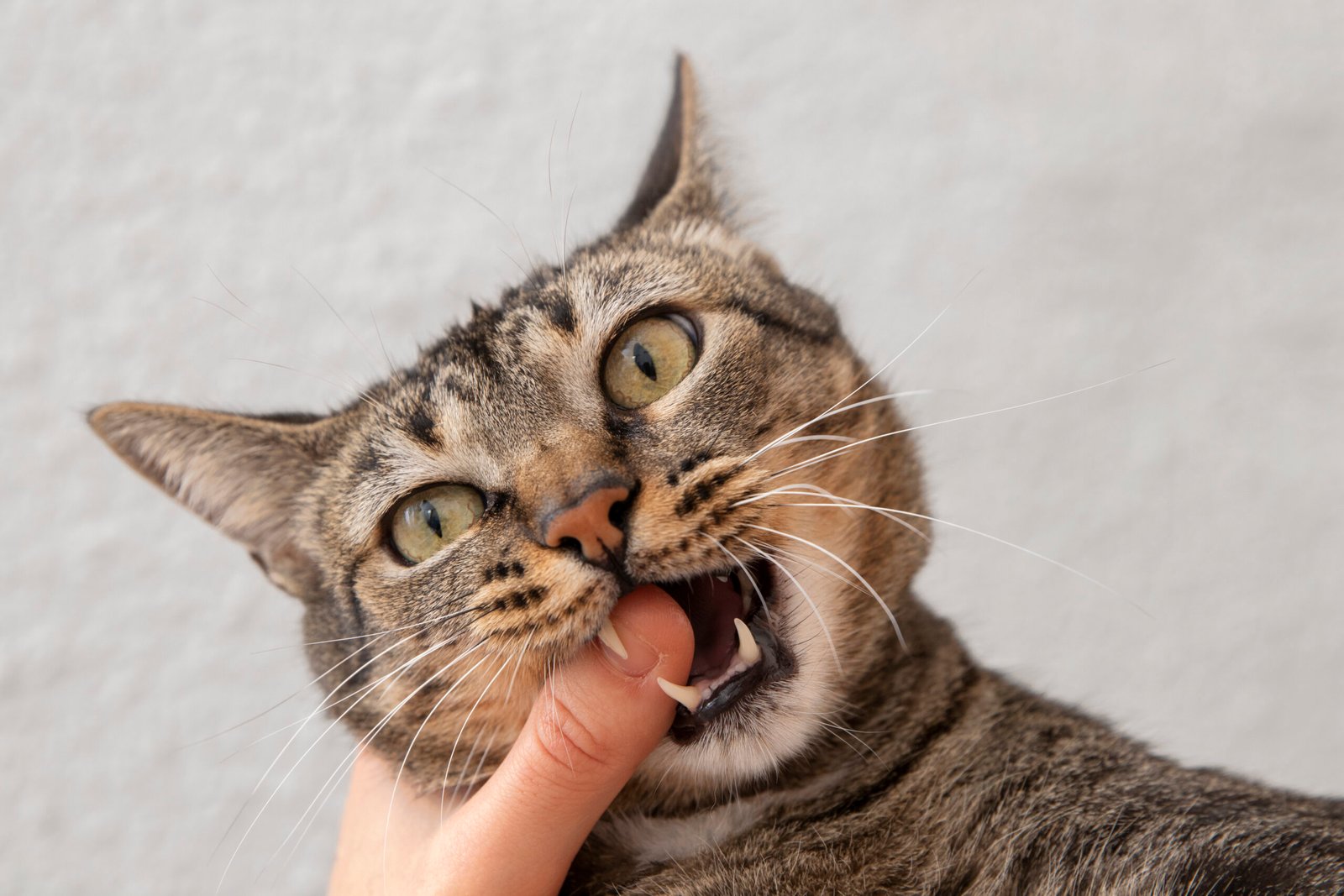Although they can be loving and affectionate, cats have a few vices, and biting may be one of them. It can be quite unexpected and painful if you have ever been playing with your pet and ended up getting snagged by some tiny, sharp teeth. So, how can we put an end to this conduct? The reasons behind this behavior will be covered in this comprehensive guide: How to stop a cat from biting you and additional advice on how to make your house the most peaceful place for you and your pet.
Understanding Why Cats Bite
Understanding the causes of cat bites is crucial before moving on to remedies. Cats do things for a variety of reasons, as any cat owner is aware. Here are a few of the most common explanations:
Act Aggressively
Hunting instincts are especially strong in kittens. They frequently imitate behaviors while playing, such as stalking and pouncing, which can include biting. Young cats need this play to develop, but if you use your hands or feet to play with them, your cat will associate those body parts with toys, and it is acceptable for them to bite.
For Example: it is quite normal for a kitten to use its teeth and claws to fight its siblings in a very rough manner. This teaches it to play in general, but it may start biting inappropriately when it starts to play humans with its hands.
Excessive stimulation
Most cats enjoy a little petting and downtime before becoming overstimulated, though this amount varies from cat to cat. However, after a few minutes of petting, your cat might get too excited and start biting to let you know it needs a break.
Overtiredness: Symptoms include twitching ears, tensed muscles, and flicking tails, which show that a game that used to be enjoyable for them is now stressful.
Fear or Protection
Cats may also bite to defend themselves if they perceive a threat. Cats are inherently wary of unfamiliar situations, odd people, and loud noises. If there is no way for a scared cat to escape, it will lash out and bite.
For instance, a scared cat that is startled by a loud noise might not be able to flee in time before reacting emotionally by biting the closest person.
Behavior in Territories
Cats are territorial beings by nature. They may bite to establish their dominance and defend their territory when someone or something invades their personal space, whether it is another pet, a newcomer to the home, or even an unfamiliar object.
For example: A visitor to your home might reach out and touch your cat, who is curled up in its favorite spot. Cats may take offense at this and respond, frequently by giving a warning nip.
Anxiety and Stress
Cats are susceptible to stress and anxiety, just like people. Changes in the environment, such as relocating, bringing in a family member, or even altering one’s own routine, can make your cat feel uneasy. Stress can cause some cats to bite.
Health Concerns
Lastly, changes in temperament, such as increased biting, may indicate other medical issues. Since cats are unable to express their discomfort verbally, they may bite as a sign.
How to stop a cat from biting you
Now that we know the causes of cat biting, we can address the most important query: what can we do to lessen or stop the behavior? Here are some good, doable strategies.
Put Toys Before Hands
Teaching your cat that your hands and feet are not toys will help them avoid biting. Here’s how to make that difference clear:
Provide Safe Toys: Purchase various cat toys, including soft toys, balls, and feather wands. Have toys on hand at all times so your cat can focus their energy on them.
Engage in interactive play with your cat by using a wand toy that has feathers, strings, or stars. This keeps a safe distance between you and their incredibly sharp teeth and claws.

Recognize the Aggression Red Flags
In order to prevent bites, you must pay close attention to your cat’s body language. You can take action before it gets to the biting stage by learning to recognize the warning signs of stress or overstimulation:
Tail Movements: Your cat may be becoming irritated if they are swatting or flicking their tail instead of leaving it at rest.
Ears: Flat ears against the head may indicate discomfort.
Body Tension: Your cat’s posture gives you a good idea of whether or not it feels threatened.
Set Boundaries While Playing
You can teach your feline that biting will result in negative consequences:
Say “Ouch”: To express discomfort, give a soft yelp or say “ouch” if your cat nibbles you while you are playing with a toy. The majority of cats react to this sound, which signals that they have gone too far.
Stop playing right away: Stop playing as soon as your cat bites. This will make it clear that biting indicates the end of a good time.
Enter-Play Control Sessions
Establish clear limits to prevent your cat from biting during unstructured playtime:
Timed Play: Try to plan brief, supervised game sessions and only use suitable toys. With these, your cat can get some exercise without requiring your hands.
Encourage a Game: Playtime that involves chasing and/or pouncing, for example, keeps your cat happy and prevents them from biting.
Provide them with numerous mental exercises.
Boredom is another factor that can trigger aggression. Maintain your cat’s mental activity by:
Interactive Toys: Keep the good times rolling with toys that make them think, like puzzle feeders.
Environmental Enrichment: Provide hiding places with boxes or tunnels, or climbing areas with cat trees.
Establish a Calm Ambience
Keeping your house calm can help your cat who is prone to anxiety by lowering stress and, consequently, biting:
Establish safe spaces for your cat to retreat to when they need to unwind.
Calming Products: To find anxiety-relieving calming sprays or diffusers, visit your local pet store.
Redirect Too Much Energy
Try rerouting your cat’s energy if they are acting feisty before playtime by:
Pre-Playtime Exercise: Before you play with something more interactive, use a laser pointer or a teaser toy to exhaust your cat.
Park Play: Have picnics, plan frequent playdates, and play outside.
How to Respond to Your Cat Biting
If your cat bites you, what should you do?
All you need to do if you get bitten is freeze in place and gradually remove your hand. Avoid panicking or making any abrupt movements that might cause more biting.
Give Them Choices: To divert their attention, offer a toy or treat right away.
Never punish your cat, regardless of how severely they bite. Any aggression will only get worse as a result. Steer clear of this: Make use of strategies for positive reinforcement.

FAQs
Do cats frequently bite their humans?
Certain bites are typical feline behavior, which may be especially true when the cat is playing or feels frightened. On the other hand, severe or violent biting might be a sign of deeper problems that need to be addressed.
When my cat bites, how can I tell if she is playing or acting aggressively?
While aggression biting is firmer and involves growling or hissing, playful biting is frequently gentle and occurs during play. By observing your cat’s body language, you can tell the difference between the two.
When my cat is playing, how can I stop her from nibbling?
Use engaging toys to play with without using your hands. Feather duster wand toys and laser pointers are examples of playthings that can be used safely to entice your cat while maintaining a safe distance between your teeth and theirs.
How can a cat be trained to stop biting?
Use techniques for positive reinforcement. When your cat plays or grooms itself, give it praise or some treats. Avoid using harsh punishments like yelling, which can frighten or perplex your cat.
Does my cat’s biting behavior stem from stress or health issues?
Indeed, biting may indicate discomfort or stress. It would be wise to consult a veterinarian if the behavior is worrisome or unusual to ensure that there is not a medical issue or unusual stress in their surroundings.
Conclusion
Finally, How Can I Prevent My Cat from Biting Me? essentially involves comprehending their actions and sternly instructing them when to stop. Here are some brief guidelines for appropriate cat play: Use toys instead of your hands, pay attention to warning signals, and only interact with your cat through controlled play in their comfort zones. Remember that it takes time and perseverance to change behavior, but it is possible!
With the correct methods, patience, and knowledge, you can enjoy all the playful and enjoyable times you spend with your cat without worrying about tiny, sharp bites. You and your cat will experience less stress if you follow the advice in this guide, which will result in safe and entertaining playtime.
You will be on your way to a bite-free experience if you keep these tips in mind the next time your cat appears ready to jump!
